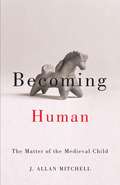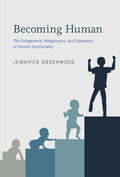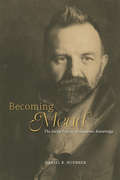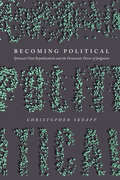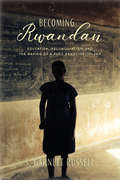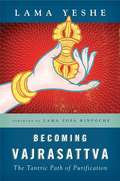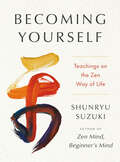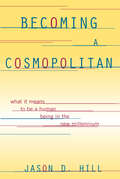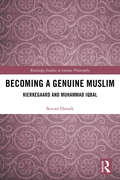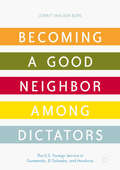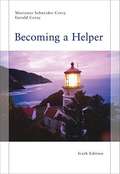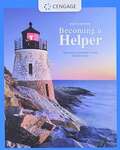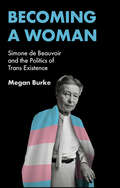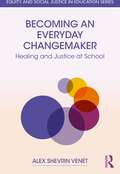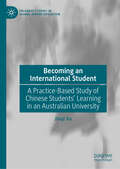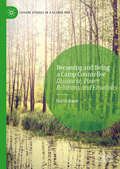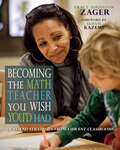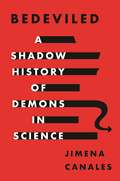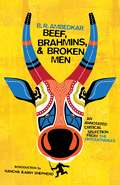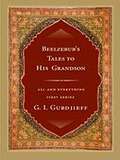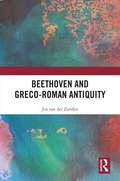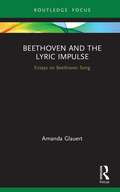- Table View
- List View
Becoming Human: The Matter of the Medieval Child
by J. Allan MitchellBecoming Human argues that human identity was articulated and extended across a wide range of textual, visual, and artifactual assemblages from the twelfth to the fifteenth centuries. J. Allan Mitchell shows how the formation of the child expresses a manifold and mutable style of being. To be human is to learn to dwell among a welter of things. A searching and provocative historical inquiry into human becoming, the book presents a set of idiosyncratic essays on embryology and infancy, play and games, and manners, meals, and other messes. While it makes significant contributions to medieval scholarship on the body, family, and material culture, Becoming Human theorizes anew what might be called a medieval ecological imaginary. Mitchell examines a broad array of phenomenal objects—including medical diagrams, toy knights, tableware, conduct texts, dream visions, and scientific instruments—and in the process reanimates distinctly medieval ontologies. In addressing the emergence of the human in the later Middle Ages, Mitchell identifies areas where humanity remains at risk. In illuminating the past, he shines fresh light on our present.
Becoming Human: The Ontogenesis, Metaphysics, and Expression of Human Emotionality (Life and Mind: Philosophical Issues in Biology and Psychology)
by Jennifer GreenwoodA novel, wide-ranging, and comprehensive account of how human emotionality develops, proposing a process in which “nature” and “nurture” are integrated. In Becoming Human, Jennifer Greenwood proposes a novel theory of the development of human emotionality. In doing so, she makes important contributions to the nature-nurture debate in emotion theory and the intracranialist–transcranialist debate in philosophy of mind. Greenwood shows that the distinction between nature and nurture is unfounded; biological and cultural resources are deeply functionally integrated throughout the developmental process. She also shows that human emotional and language development are transcranialist achievements; human ontogenesis takes place in extended cognitive systems that include environmental, technological, and sociocultural resources. Greenwood tells the story of how each of us becomes a full human being: how human brains are constructed and how these brains acquire their contents through massive epigenetic scaffolding. After an introduction in which she explains the efficiency of the human newborn as a learning machine, Greenwood reviews traditional and contemporary theories of emotion, highlighting both strengths and limitations. She addresses the intracranialist–transcranialist debate, arguing that transcranialists have failed to answer important intracranialist objections; describes the depth of the functional integration of intraneural and external resources in emotional ontogenesis; examines early behavior patterns that provide the basis for the development of language; explains the biosemantic theory of representational content, and the wider cognitive systems that define it; and argues that language production and comprehension are always context dependent. Finally, in light of the deep and complex functional integration of neural, corporeal, and sociocultural resources in human ontogenesis, she recommends a multidisciplinary, collaborative approach for future research.
Becoming Mead: The Social Process of Academic Knowledge
by Daniel R. HuebnerGeorge Herbert Mead is a foundational figure in sociology, best known for his book "Mind, Self, and Society," which was put together after his death from course notes taken by stenographers and students and from unpublished manuscripts. Mead, however, never taught a course primarily housed in a sociology department, and he wrote about a wide variety of topics far outside of the concerns for which he is predominantly rememberedOCoincluding experimental and comparative psychology, the history of science, and relativity theory. a In short, he is known in a discipline in which he did not teach for a book he did not write. In" Becoming Mead," Daniel R. Huebner traces the ways in which knowledge has been produced by and about the famed American philosopher. Instead of treating MeadOCOs problematic reputation as a separate topic of study from his intellectual biography, Huebner considers both biography and reputation as social processes of knowledge production. He uses Mead as a case study and provides fresh new answers to critical questions in the social sciences, such as how authors come to be considered canonical in particular disciplines, how academics understand and use othersOCO works in their research, and how claims to authority and knowledge are made in scholarship. "Becoming Mead" provides a novel take on the history of sociology, placing it in critical dialogue with cultural sociology and the sociology of knowledge and intellectuals. "
Becoming Political: Spinoza’s Vital Republicanism and the Democratic Power of Judgment
by Christopher SkeaffIn this pathbreaking work, Christopher Skeaff argues that a profoundly democratic conception of judgment is at the heart of Spinoza’s thought. Bridging Continental and Anglo-American scholarship, critical theory, and Spinoza studies, Becoming Political offers a historically sensitive, meticulous, and creative interpretation of Spinoza’s texts that reveals judgment as the communal element by which people generate power to resist domination and reconfigure the terms of their political association. If, for Spinoza, judging is the activity which makes a people powerful, it is because it enables them to contest the project of ruling and demonstrate the political possibility of being equally free to articulate the terms of their association. This proposition differs from a predominant contemporary line of argument that treats the people’s judgment as a vehicle of sovereignty—a means of defining and refining the common will. By recuperating in Spinoza’s thought a “vital republicanism,” Skeaff illuminates a line of political thinking that decouples democracy from the majoritarian aspiration to rule and aligns it instead with the project of becoming free and equal judges of common affairs. As such, this decoupling raises questions that ordinarily go unasked: what calls for political judgment, and who is to judge? In Spinoza’s vital republicanism, the political potential of life and law finds an affirmative relationship that signals the way toward a new constitutionalism and jurisprudence of the common.
Becoming Rwandan: Education, Reconciliation, and the Making of a Post-Genocide Citizen (Genocide, Political Violence, Human Righ)
by S. Garnett RussellIn the aftermath of the genocide, the Rwandan government has attempted to use the education system in order to sustain peace and shape a new generation of Rwandans. Their hope is to create a generation focused on a unified and patriotic future rather than the ethnically divisive past. Yet, the government’s efforts to manipulate global models around citizenship, human rights, and reconciliation to serve its national goals have had mixed results, with new tensions emerging across social groups. Becoming Rwandan argues that although the Rwandan government utilizes global discourses in national policy documents, the way in which teachers and students engage with these global models distorts the intention of the government, resulting in unintended consequences and undermining a sustainable peace.
Becoming Vajrasattva
by Nicholas Ribush Lama Thubten Zopa Rinpoche Lama Thubten Yeshe"The practice of purification is one of the most important solutions to life's problems." - Lama Zopa Rinpoche Common to all four traditions of Tibetan Buddhism, the practice of Vajrasattva is used to purify negative karma, illness, and obstacles to spiritual development. Lama Yeshe, the inspirational teacher who strongly influenced the development of Buddhism in the West, found that the practice of Vajrasattva brought dramatic results for his Western students. Becoming Vajrasattva is a complete guide to this purification practice, providing instruction on the method, commentary on the traditional texts, and insight into tantra. Also included is an entire section of complete retreat instructions - indispensable reading material for anyone undertaking a retreat in the Tibetan tradition.
Becoming Yourself: Teachings on the Zen Way of Life
by Shunryu SuzukiFrom the beloved author of Zen Mind, Beginner&’s Mind comes a new book of teachings on the essence of Zen practice"I felt a burden being lifted from my shoulders just by reading this remarkable book." —Oliver Burkeman&“Our way of sitting is for you to become yourself.&”In this long-awaited book from one of the most influential spiritual teachers of the last century, Shunryu Suzuki Roshi shares simple, warmhearted teachings on a practice that is fundamentally about becoming yourself. In his inimitable style, filled with humor and insight, Becoming Yourself speaks directly to the newest beginners while also serving as a touchstone and a continual source of inspiration for even the most experienced practitioners and Zen teachers.Becoming Yourself unearths new jewels from the late Suzuki&’s lectures and brings to light many of his unpublished teachings.Becoming yourself is not meant to be understood as an idea; it is meant to be tried out as a way of being. It is &“Just to sit,&” a practice of wholeheartedly being as you are, moment after moment, no matter what is happening. It is a practice of deeply connecting with how it feels to be alive in your surroundings, whether on a meditation cushion or not, and stepping forward from that connection. It is opening to your life, wherever you are, and finding right there a deep well of innate wisdom, compassion and care.
Becoming a Cosmopolitan: What It Means to Be a Human Being in the New Millennium
by Jason D HillThe philosopher and author of Beyond Blood Identities offers a new paradigm of persona freedom and moral self-possession. As a Jamaican immigrant arriving in the United States at the age of twenty, Jason Hill noticed how often Americans identified themselves in terms of race and ethnicity. He observed, for example, the reluctance of West Indians to joins 'black causes' for fear of losing their identity. He began to ask himself what sort of world he wanted to live in, a quest that in time led him to the idea of the cosmopolitan. In Becoming a Cosmopolitan, Jason D. Hill argues that we need a new understanding of the self. He revives the idea of the cosmopolitan, the person who identifies the world as home. Arguing for the right to forget where we came from, Hill proposes a new moral cosmopolitanism for the new millennium.
Becoming a Genuine Muslim: Kierkegaard and Muhammad Iqbal (Routledge Studies in Islamic Philosophy)
by Sevcan OzturkDespite the apparent lack of any cultural and religious connection between Kierkegaard and Iqbal, their philosophical and religious concerns and their methods of dealing with these concerns show certain parallels. This book provides a Kierkegaardian reading of Muhammad Iqbal’s idea of becoming a genuine Muslim. It reflects on the parallels between the philosophical approaches of Kierkegaard and Iqbal, and argues that, though there are certain parallels between their approaches, there is a significant difference between their philosophical stances. Kierkegaard was concerned with developing an existential dialectics; Iqbal, however, focused mostly on the identification of the problems of the modern Muslim world. As a result, Iqbal’s idea of becoming a genuine Muslim – the practical aspect of his thought and one of the most central issues of his philosophy – seems to be unclear and even contradictory at points. This book therefore uses the parallels between the two philosophers' endeavours and the notions developed by Kierkegaard to provide a strong hermeneutical tool for clarifying where the significance of Iqbal’s idea of becoming a Muslim lies. By bringing together two philosophers from different cultural, traditional and religious backgrounds, this book will appeal to students and scholars of Comparative Politics, Contemporary Islamic Philosophy and the Philosophy of Religion.
Becoming a Good Neighbor among Dictators: The U.S. Foreign Service in Guatemala, El Salvador, and Honduras
by Jorrit van den BerkVery few works of history, if any, delve into the daily interactions of U. S. Foreign Service members in Latin America during the era of Roosevelt's Good Neighbor Policy. But as Jorrit van den Berk argues, the encounters between these rank-and-file diplomats and local officials reveal the complexities, procedures, intrigues, and shifting alliances that characterized the precarious balance of U. S. foreign relations with right-wing dictatorial regimes. Using accounts from twenty-two ministers and ambassadors, Becoming a Good Neighbor among Dictators is a careful, sophisticated account of how the U. S. Foreign Service implemented ever-changing State Department directives from the 1930s through the Second World War and early Cold War, and in so doing, transformed the U. S. -Central American relationship. How did Foreign Service officers translate broad policy guidelines into local realities? Could the U. S. fight dictatorships in Europe while simultaneously collaborating with dictators in Guatemala, El Salvador, and Honduras? What role did diplomats play in the standoff between democratic and authoritarian forces? In investigating these questions, Van den Berk draws new conclusions about the political culture of the Foreign Service, its position between Washington policymakers and local actors, and the consequences of foreign intervention.
Becoming a Helper (6th edition)
by Gerald Corey Marianne Schneider CoreyWritten by a therapist and a psychology professor, this supplementary text for those embarking on a career in the helping professions focuses on the struggles faced by practitioners and the effects of the demands placed on them. Sample topics include understanding your family of origin; dealing with difficult clients; and managing boundary issues. Self-assessments and inventories found in each chapter encourage students to examine their own motives and aptitudes for becoming helpers. The fifth edition contains new information on ethics, diversity, and social activism.
Becoming a Helper (Mindtap Course List Series)
by Gerald Corey Marianne Schneider CoreyConsidering a career in the helping professions? Corey and Corey's BECOMING A HELPER, Eighth Edition, is a must read! Drawing from years of experience in the classroom and in real-world practice, the authors focus on the struggles, anxieties and uncertainties students often encounter on the road to becoming effective helpers. The book provides an overview of the stages of the helping process as it equips you with the skills and knowledge you need to become a successful helping professional. Emphasizing self-reflection, the authors give you a candid insider's look at the demands, strains and challenges of the field -- helping you determine if a helping professions career is the right choice for you. In addition, MindTap empowers you with anywhere, anytime digital learning solutions to help you maximize your course success.
Becoming a Woman: Simone de Beauvoir and the Politics of Trans Existence
by Megan BurkeThis highly engaging analysis of the contemporary, global social and political landscape of trans antagonisms draws specific attention to ""gender-critical” mobilizations of Simone de Beauvoir's account of becoming a woman in The Second Sex to advance and justify trans exclusionary positions. Through a careful examination and application of Beauvoir's philosophical and political commitments, Becoming a Woman compellingly explores the significance of her notion of becoming as not only affirmative of trans women, but also as an ethical demand to affirm trans possibilities. More than a reply to gender-critical readings of Beauvoir, this book develops an original, Beauvoirian ethics of gender affirmation offering that show why we ought to challenge trans exclusion and anti-trans movements.
Becoming an Everyday Changemaker: Healing and Justice At School (Equity and Social Justice in Education Series)
by Alex Shevrin VenetEducators with a vision for more equitable, caring schools often struggle with where to begin. I’m just one teacher, where can I start to make change? Is it even possible? How do I do this within current constraints? In this new book, bestselling author Alex Shevrin Venet empowers everyday changemakers by showing how equity-centered trauma-informed practices can guide our approach to school change. Unlike other books on social justice, this powerful resource doesn’t tell you which changes to implement; instead, it focuses on helping you develop the skills, strategies, and tools for making change meaningful and effective.Topics include change opportunities and why trauma makes change harder; skills for navigating the change journey such as building relationships, working from strengths, and navigating many streams of information; and sustainable structures for lasting change. Throughout, there are reflection questions to use as conversation-starters with fellow changemakers, as well as Rest Stops so you can pause and process what you are thinking about and learning. This book will help you start your change journey now, putting you and your students on the path to equity, justice, and healing.
Becoming an International Student: A Practice-Based Study of Chinese Students' Learning in an Australian University (Palgrave Studies in Global Higher Education)
by Jinqi XuThis book provides a unique perspective on internationalization in higher education, focusing on the experiences of Chinese business students in Australia. It challenges conventional views by investigating the nuances of Chinese students’ learning, rather than just addressing learning style differences and language barriers. The author’s personal experience as a Chinese international student, and an academic in China turned academic in Australia lends authenticity to the exploration of teaching and engaging with this demographic. The book employs a practice-based study, drawing on the metaphor of ‘becoming’ to examine the everyday practices of five Chinese business undergraduate students. The innovative use of a practice-based theoretical framework influenced by the Chinese philosophical concept of yinyang sets this book apart. This approach illuminates the intricate connections between study practices and socio-cultural influences, offering a holistic understanding of learning. The book uncovers the transformative nature of student learning through interpretative methods such as semi-structured interviews, informal interviews, reflective group discussions, participative observation, and artefacts , highlighting the fluidity and complexity across diverse contexts. This book is a valuable resource for educators and policymakers, offering insights into the ongoing process of becoming that characterizes Chinese students’ learning.
Becoming and Being a Camp Counsellor: Discourse, Power Relations and Emotions (Leisure Studies in a Global Era)
by Mandi BakerThis book explores the complexities of the recreational summer camp experience and its reliance on the expertise and emotion work of young people. Drawing on post-structural theory, Baker illustrates the discourses, power relations and emotional demands that shape camp counsellor employment experiences and well-being. Through analysis of everyday experiences and interactions, Baker unpicks the power nexus between counsellors, campers, peers and camp management, offering a deeper understanding of camp counsellor employment and the challenges for camp employees and employers. As such, this book raises a call for camp researchers and industry leaders to engage in rethinking how camp counsellor roles are understood, shaped and embodied, and how they might be ethically supported through reflexive management practices. Becoming and Being a Camp Counsellor will be of interest to scholars and students across the fields of leisure, outdoor recreation, youth studies, and sociology.
Becoming the Math Teacher You Wish You'd Had: Ideas and Strategies from Vibrant Classrooms
by Tracy Johnston ZagerAsk mathematicians to describe mathematics and they' ll use words like playful, beautiful, and creative. Pose the same question to students and many will use words like boring, useless, and even humiliating. Becoming the Math Teacher You Wish You' d Had, author Tracy Zager helps teachers close this gap by making math class more like mathematics. Zager has spent years working with highly skilled math teachers in a diverse range of settings and grades and has compiled those' ideas from these vibrant classrooms into' this game-changing book. Inside you' ll find: ' How to Teach Student-Centered Mathematics:' Zager outlines a problem-solving approach to mathematics for elementary and middle school educators looking for new ways to inspire student learning Big Ideas, Practical Application:' This math book contains dozens of practical and accessible teaching techniques that focus on fundamental math concepts, including strategies that simulate connection of big ideas; rich tasks that encourage students to wonder, generalize, hypothesize, and persevere; and routines to teach students how to collaborate Key Topics for Elementary and Middle School Teachers:' Becoming the Math Teacher You Wish You' d Had' offers fresh perspectives on common challenges, from formative assessment to classroom management for elementary and middle school teachers No matter what level of math class you teach, Zager will coach you along chapter by chapter. All teachers can move towards increasingly authentic and delightful mathematics teaching and learning. This important book helps develop instructional techniques that will make the math classes we teach so much better than the math classes we took.
Bedeviled: A Shadow History of Demons in Science
by Jimena CanalesHow scientists through the ages have conducted thought experiments using imaginary entities—demons—to test the laws of nature and push the frontiers of what is possible Science may be known for banishing the demons of superstition from the modern world. Yet just as the demon-haunted world was being exorcized by the enlightening power of reason, a new kind of demon mischievously materialized in the scientific imagination itself. Scientists began to employ hypothetical beings to perform certain roles in thought experiments—experiments that can only be done in the imagination—and these impish assistants helped scientists achieve major breakthroughs that pushed forward the frontiers of science and technology.Spanning four centuries of discovery—from René Descartes, whose demon could hijack sensorial reality, to James Clerk Maxwell, whose molecular-sized demon deftly broke the second law of thermodynamics, to Darwin, Einstein, Feynman, and beyond—Jimena Canales tells a shadow history of science and the demons that bedevil it. She reveals how the greatest scientific thinkers used demons to explore problems, test the limits of what is possible, and better understand nature. Their imaginary familiars helped unlock the secrets of entropy, heredity, relativity, quantum mechanics, and other scientific wonders—and continue to inspire breakthroughs in the realms of computer science, artificial intelligence, and economics today.The world may no longer be haunted as it once was, but the demons of the scientific imagination are alive and well, continuing to play a vital role in scientists' efforts to explore the unknown and make the impossible real.
Beef, Brahmins, and Broken Men: An Annotated Critical Selection from The Untouchables
by B. R. AmbedkarOne of twentieth-century India’s great polymaths, statesmen, and militant philosophers of equality, B. R. Ambedkar spent his life battling Untouchability and instigating the end of the caste system. In his 1948 book The Untouchables, he sought to trace the origin of the Dalit caste. Beef, Brahmins, and Broken Men is an annotated selection from this work, just as relevant now, when the oppression of and discrimination against Dalits remains pervasive.Ambedkar offers a deductive, and at times a speculative, history to propose a genealogy of Untouchability. He contends that modern-day Dalits are descendants of those Buddhists who were fenced out of caste society and rendered Untouchable by a resurgent Brahminism since the fourth century BCE. The Brahmins, whose Vedic cult originally involved the sacrifice of cows, adapted Buddhist ahimsa and vegetarianism to stigmatize outcaste Buddhists who were consumers of beef. The outcastes were soon relegated to the lowliest of occupations and prohibited from participation in civic life. To unearth this lost history, Ambedkar undertakes a forensic examination of a wide range of Brahminic literature. Heavily annotated with an emphasis on putting Ambedkar and recent scholarship into conversation, Beef, Brahmins, and Broken Men assumes urgency as India witnesses unprecedented violence against Dalits and Muslims in the name of cow protection.
Beelzebub's Tales to His Grandson: An Objectively Impartial Criticism of the Life of Man
by G. I. GurdjieffWith Beelzebub's Tales to His Grandson, G. I. Gurdjieff intended to "destroy, mercilessly . . . the beliefs and views about everything existing in the world." This novel beautifully brings to life the visions of humanity for which Gurdjieff has become esteemed. Beelzebub, a man of worldly (and other-worldly) wisdom, shares with his grandson the anecdotes, personal philosophies, and lessons learned from his own life.The reader is given a detailed discussion of all matters physical, natural, and spiritual, from the creation of the cosmos to man's teleological purpose in the universe. This edition of Beelzebub's Tales to His Grandson--the first single-volume paperback to appear in English--restores the original, authoritative translation.
Beethoven and Greco-Roman Antiquity
by Jos van ZandenLudwig van Beethoven had a life beyond music. He considered it his duty to spend leisure-time improving his Bildung (sophistication). To this end he familiarised himself with tangible manifestations of Greco-Roman antiquity, for he perceived these cultures and their representatives as examples of intellectual, moral, and artistic perfection. He consumed such writers as Homer, Plutarch, Horace, Tacitus, Euripides, and Greek poets. These texts were morally uplifting for him, and advantageous for building character. They now hold a key to Beethoven’s ideal of a steadfast, austere, and Stoic outlook, necessary for a ‘great man’ to carry out his duties. Jos van der Zanden demonstrates that Beethoven’s engagement with Greco-Roman culture was deep and ongoing, and that it ventured beyond the non-committal. Drawing on a comprehensive investigation of primary sources (letters, conversation books, diaries, recollections of contemporaries) he examines what Beethoven knew of such topics like history, art, politics, and philosophy of antiquity. The book presents new information on the composer’s republicanism, his familiarity with the works of Plato, his admiration of the elderly Brutus, his plan to utilize ‘unresolved dissonances’ in an unknown piece of music, and his decision to subscribe to a book about ancient Greek poetry. A hitherto unknown vocal piece based on lines by Euripides is revealed. The study concludes with a comprehensive survey of all compositions and sketches by Beethoven based on Greco-Roman subjects.
Beethoven and the Lyric Impulse: Essays on Beethoven Song (Routledge Voice Studies)
by Amanda GlauertAmanda Glauert revisits Beethoven’s songs and studies his profound engagement with the aesthetics of the poets he was setting, particularly those of Herder and Goethe. The book offers readers a rich exploration of the poetical and philosophical context in which Beethoven found himself when composing songs. It also offers detailed commentaries on possible responses to specific songs, responses designed to open up new ways for performing, hearing and appreciating this provocative song repertoire. This study will be of great interest to researchers of Beethoven; German song; aesthetics of words and music.
Before Anarchy
by Theodore ChristovHow did the 'Hobbesian state of nature' and the 'discourse of anarchy' - separated by three centuries - come to be seen as virtually synonymous? Before Anarchy offers a novel account of Hobbes's interpersonal and international state of nature and rejects two dominant views. In one, international relations is a warlike Hobbesian anarchy, and in the other, state sovereignty eradicates the state of nature. In combining the contextualist method in the history of political thought and the historiographical method in international relations theory, Before Anarchy traces Hobbes's analogy between natural men and sovereign states and its reception by Pufendorf, Rousseau and Vattel in showing their intellectual convergence with Hobbes. Far from defending a 'realist' international theory, the leading political thinkers of early modernity were precursors of the most enlightened liberal theory of international society today. By demolishing twentieth-century anachronisms, Before Anarchy bridges the divide between political theory, international relations and intellectual history.
Before Queer Theory: Victorian Aestheticism and the Self
by Dustin FriedmanA reimagining of how the aesthetic movement of the Victorian era ushered in modern queer theory.Late Victorian aesthetes were dedicated to the belief that an artwork's value derived solely from its beauty, rather than any moral or utilitarian purpose. Works by these queer artists have rarely been taken seriously as contributions to the theories of sexuality or aesthetics. But in Before Queer Theory, Dustin Friedman argues that aestheticism deploys its "art for art's sake" rhetoric to establish a nascent sense of sexual identity and community.Friedman makes the case for a claim rarely articulated in either Victorian or modern culture: that intellectually, creatively, and ethically, being queer can be an advantage not in spite but because of social hostility toward nonnormative desires. Showing how aesthetes—among them Walter Pater, Oscar Wilde, Vernon Lee, and Michael Field—harnessed the force that Georg Wilhelm Friedrich Hegel called "the negative," Friedman reveals how becoming self-aware of one's sexuality through art can be both liberating and affirming of humanity's capacity for subjective autonomy.Challenging one of the central precepts of modern queer theory—the notion that the heroic subject of Enlightenment thought is merely an effect of discourse and power—Friedman develops a new framework for understanding the relationship between desire and self-determination. He also articulates an innovative, queer notion of subjective autonomy that encourages reflecting critically on one's historical moment and envisioning new modes of seeing, thinking, and living that expand the boundaries of social and intellectual structures. Before Queer Theory is an audacious reimagining that will appeal to scholars with interests in Victorian studies, queer theory, gender and sexuality studies, and art history.
Before Sunrise, Before Sunset, Before Midnight: A Philosophical Exploration (Philosophers on Film)
by Hans Maes Katrien SchaubroeckRichard Linklater’s celebrated Before trilogy chronicles the love of Jesse (Ethan Hawke) and Céline (Julie Delpy) who first meet up in Before Sunrise, later reconnect in Before Sunset and finally experience a fall-out in Before Midnight. Not only do these films present storylines and dilemmas that invite philosophical discussion, but philosophical discussion itself is at the very heart of the trilogy. This book, containing specially commissioned chapters by a roster of international contributors, explores the many philosophical themes that feature so vividly in the interactions between Céline and Jesse, including: the nature of love, romanticism and marriage the passage and experience of time the meaning of life the art of conversation the narrative self gender death Including an interview with Julie Delpy in which she discusses her involvement in the films and the importance of studying philosophy, Before Sunrise. Before Sunset. Before Midnight: A Philosophical Exploration is essential reading for anyone interested in philosophy, aesthetics, gender studies, and film studies.
